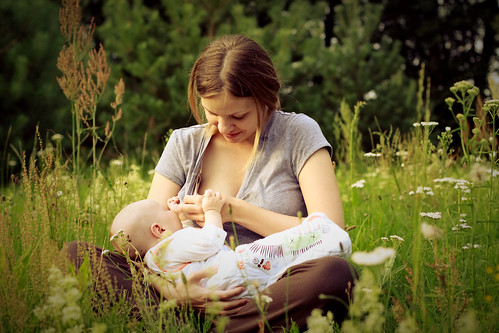Photo Credit: <a href="http://www.flickr.com/photos/aurimas_m/3802740128/">c r z</a> via <a href="http://photopin.com">photopin</a> <a href="http://creativecommons.org/licenses/by-sa/2.0/">cc</a>
Man-made chemicals called persistent organic pollutants (POPs) are of most concern. They spread through the environment and are stored in the fatty tissues of fish and animals until they reach the top of the food chain, humans. Once in humans, they are are stored in our fat, and our fat is necessary for the production of breast milk. When a nursing mother feeds her child, these POPs are released into the breast milk. Examples of POPs include certain pesticides, dioxin, toxic metals (lead, mercury, cadmium), flame retardants and PCBs.
What can mothers do?
Here is a list provided by the National Resources Defense Council.
- "Quit smoking or never start, and keep others from smoking in your house or car
- Avoid alcoholic beverages
- Avoid use of pesticides in the home and garden or on pets
- Avoid exposure to solvents, such as paints, non-water-based glues, furniture strippers, gasoline fumes, perfume and nail polish
- Avoid dry cleaners and recently dry-cleaned clothes
- Eat a balanced diet low in animal fats and high-fat dairy products
- Avoid fish that may have high mercury or PCB levels, such as swordfish, shark, tuna and locally caught fish (see NRDC's guide to Mercury Contamination in Fish for more information)
- Eat organically grown food, if available"
Do these toxins harm you baby? A 2009, CDC study found that levels of certain toxins were higher in formula than they were in breast milk. Also, breastmilk may contain bacteria that can metabolize perchlorate, another environmental toxin found in breastmilk. Scientists and doctors still promote breastfeeding as the best option for mothers and children, if possible.
What else can mothers do?
Again, I support, Safer Chemicals Health Families and their actions on tougher regulation for toxic chemicals.

No comments:
Post a Comment